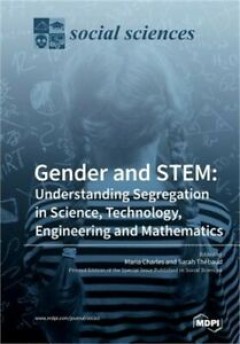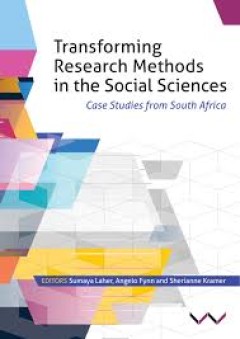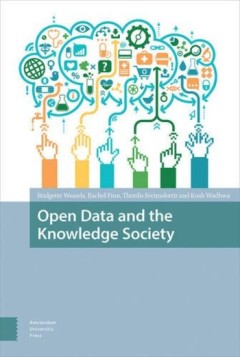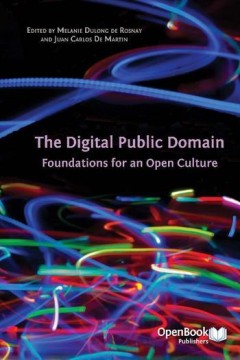Filter by

Gender and STEM : understanding segregation in science, technology, engineeri…
This volume features thirteen original chapters on the causes and consequences of gender segregation in scientific, technical, engineering, and mathematics (“STEM”) occupations and fields of study. Although women have made great strides in equalizing access to labor markets and higher education, many STEM fields—particularly in the physical sciences and engineering—remain strongholds of…
- Edition
- -
- ISBN/ISSN
- 9783038971474
- Collation
- ix, 271p. : ill.
- Series Title
- -
- Call Number
- 510.71 GEN g

Transforming research methods in the social sciences: case studies from South…
editors, Sumaya Laher, Angelo Fynn and Sherianne Kramer.
- Edition
- -
- ISBN/ISSN
- 9781776143559
- Collation
- xiv, 442 pages : illustrations ; 25 cm
- Series Title
- -
- Call Number
- 300.721 LAH t

Instructional scaffolding in STEM education : strategies and efficacy evidence
This book uses meta-analysis to synthesize research on scaffolding and scaffolding-related interventions in STEM (science, technology, engineering, and mathematics) education. Specifically, the volume examines the extent to which study quality, assessment type, and scaffolding characteristics (strategy, intended outcome, fading schedule, scaffolding intervention, and paired intervention) influe…
- Edition
- -
- ISBN/ISSN
- 9783319025650
- Collation
- xi, 144p. : ill.
- Series Title
- -
- Call Number
- 510.71 BEL i

Planning and managing scientific researchf: a guide for the beginning researcher
Although there are many books on project management, few address the issues associated with scientific research. This work is based on extensive scientific research and management experiences and is designed to provide an introduction to planning and managing scientific research for the beginning researcher. The aim is to build an understanding of the nature of scientific research, and the way …
- Edition
- -
- ISBN/ISSN
- 9781925021585
- Collation
- ix, 93p.: ill.
- Series Title
- -
- Call Number
- 001.4068 KEN p

Battle for Open: How openness won and why it doesn't feel like victory
With the success of open access publishing, Massive open online courses (MOOCs) and open education practices, the open approach to education has moved from the periphery to the mainstream. This marks a moment of victory for the open education movement, but at the same time the real battle for the direction of openness begins. As with the green movement, openness now has a market value and is su…
- Edition
- -
- ISBN/ISSN
- 9781909188365
- Collation
- x, 232p. : ill.
- Series Title
- -
- Call Number
- 378.17344678 WEL b

Internet research ethics
This anthology addresses ethical challenges that arise within the field of Internet research. Among the issues discussed in the book are the following: When is voluntary informed consent from research subjects required in using the Internet as a data source? How may researchers secure the privacy of research subjects in a landscape where the traditional public/private distinction is blurred an…
- Edition
- -
- ISBN/ISSN
- 9788202489519
- Collation
- 175p.: ill.
- Series Title
- -
- Call Number
- 174.90014 ENJ i

The globalization of knowledge in history : based on the 97th Dahlem Workshop
Today scientific, technological and cultural knowledge is shared worldwide. The extent to which globalized knowledge also existed in the past is an open question and, moreover, a question that is important for understanding present processes of globalization. This book, the first volume of the series "Studies" of the "Max Planck Research Library for the History and Development of Knowledge," th…
- Edition
- -
- ISBN/ISSN
- 9783844222388
- Collation
- 866p. : ill.
- Series Title
- -
- Call Number
- 001.01 GLO g

Open data and the knowledge society
This book considers the role of the open data movement in fostering transformation toward a 'knowledge society'.
- Edition
- -
- ISBN/ISSN
- 9789462980181
- Collation
- 203p. : ill.
- Series Title
- -
- Call Number
- 070.4 WES o

Perspectives for the Next Generation of Virus Research: Spearheading the Use …
Infectious diseases are associated with approximately 20% of global mortality, with viral diseases causing about one third of these deaths. Besides newly emerging and re-emerging viral infections will continue to pose a threat to human survival globally. In this case scientific advances have greatly been increased to defend against those pathogens. For example, rapid genomic sequencing, proteom…
- Edition
- -
- ISBN/ISSN
- 9782889452156
- Collation
- 192p.: ill.
- Series Title
- -
- Call Number
- 616.01 YAM p

The digital public domain : foundations for an open culture
Digital technology has made culture more accessible than ever before. Texts, audio, pictures and video can easily be produced, disseminated, used and remixed using devices that are increasingly user-friendly and affordable. However, along with this technological democratization comes a paradoxical flipside: the norms regulating culture's use —copyright and related rights —have become increa…
- Edition
- -
- ISBN/ISSN
- 9781906924478
- Collation
- xxv, 220p. : ill.
- Series Title
- -
- Call Number
- 346.048 DIG d
 Computer Science, Information & General Works
Computer Science, Information & General Works  Philosophy & Psychology
Philosophy & Psychology  Religion
Religion  Social Sciences
Social Sciences  Language
Language  Pure Science
Pure Science  Applied Sciences
Applied Sciences  Art & Recreation
Art & Recreation  Literature
Literature  History & Geography
History & Geography